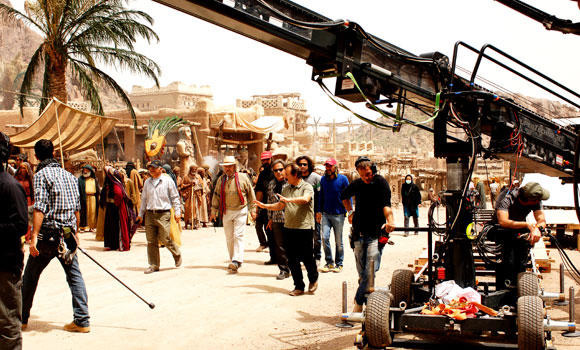ALLAHYAR, Iran: Here in this Persian replica of Makkah, built at the cost of millions of dollars, an Iranian film company is attempting to make a film on the life of Prophet Muhammad (peace be upon him). The most expensive film in Iranian history — Muhammad, Messenger of God — already has been criticized before its even widely released.
In Islam, portraying the Prophet (pbuh) is not allowed. Islamic tradition is full of written descriptions of Prophet Muhammad (pbuh) and his qualities — describing him as the ideal human being. But scholars agree that trying to depict that ideal is forbidden.
In the new 190-minute film, the story focuses on the Prophet’s childhood, never showing his face. The movie instead uses others to tell his story, like his grandfather Abdul-Muttalib.
“For Muslims, the Prophet Muhammad is a mercy to the world and the hereafter,” said Majid Majidi, the film’s director.
The film already has seen widespread criticism even before being widely released. In February, Egypt’s Al-Azhar, one of Islam’s most prestigious seats of learning, called on Iran to ban a film it described as debasing the sanctity of messengers from God. Meanwhile, Qatar has announced plans to have its own $1 billion epic shot on the Prophet’s life.
Majidi said he would be ready to cooperate with any Islamic country planning a film on Prophet Muhammad (pbuh).
Producers plan to ultimately release the film in Arabic, Persian and English, with showings across Iran and abroad in the summer. Filming took a year, while postproduction in Germany took two more years.
Mohammad Mahdi Heidarian, head of the private Nourtaban Film Industry company, said his company spent about $30 million in total to make the movie.
In the past, such religious films have done well in Iran. The 1977 Qur’anic epic “The Message,” starring Anthony Quinn as the uncle of the unseen and unheard Prophet (pbuh), drew crowds and long lines to movie theaters in Tehran. And another that did well was DeMille’s own 1956 film, “The Ten Commandments” on Prophet Moses.
Iranian film drawing criticism for Prophet’s portrayal
Iranian film drawing criticism for Prophet’s portrayal











